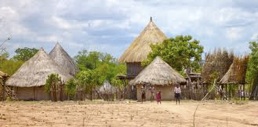Do you want to subscribe?
Subscribe today.
Cancel SubscribeWhen you open this pub again using this browser, you'll be returned to this page. When you move to the next page the bookmark will be moved to that page (if you move back the bookmark will remain on the furthest page to which you've read). By touching the bookmark you can set the bookmark to whichever page you are on.
More bookmark features coming soon.
You must login to publish and add your own notes. Eventually you will be able to see others contributions if they make them public.
More notes features coming soon.
Published: March 12, 2013
Help the people of Binga create new self-sufficient sustainable buildings as part of a new Eco-Village. Course materials are being developed by the Zambesi Technical College in Binga with volunteer support from around the world.
For centuries the Tonga people lived in the Gwembe Valley along the north and south banks of the Zambezi River. In 1958 they were forced to move out of their habitat by the rising waters of Lake Kariba due to the damming of the Zambezi - a hydroelectric project of the then Federation of Rhodesia and Nyasaland. The new lake physically separated this resettlement. The Tonga people were incorporated into two different nations - Zambia and Zimbabwe. Now the Tonga are the third-largest ethnic and language group after the Shona and Ndebele, and the most marginalized in the country.
The building of the Kariba Dam brought electricity to the rest of Zimbabwe and some national revenue with commercial benefits from tourism, and manufacturing industries. However, these benefits have all but completely bypassed the Tonga people of Zimbabwe.
The planning for this project did not consider the important cognitive needs of the Tonga community. One researcher highlighted a painful fact that the labour to construct the dam was drawn from Italy, Tanzania and Malawi and not from local labour.

The Binga district is regarded as one of the poorest and disadvantaged places in Zimbabwe because of its high levels of illiteracy and poverty. Binga also suffers serious disadvantages of two other factors - 1) limited agricultural potential due to poor agro-ecological conditions and the presence of wildlife and animal diseases, and - 2) being far from markets and therefore receiving poor supplies of food at high prices, all the while earning low prices for their items like livestock, which are sold out of the area.

Because of erratic, low rainfall and the poor soil in Binga, the Tonga community have become a people dependent upon the government, Non-Governmental Organisations (NGOs), and churches for relief food. The Zambezi River land used to sustain the Tonga people. Now the people need donations from the outside world to survive.
The plight of the Tonga people, after the building of the Kariba Dam, has inspired Takura Trust of Binga, chaired by Sarudzai Mutana (PhD Student) to establish an Eco-Village in Binga from which the majority of the Tonga people will learn skills that apply local resources to build decent and sustainable eco-homes. Investment in a project that applies low cost techniques on rainwater harvesting, alternative sources of energy and permaculture will bring infinite returns to the Tonga people and help them move into a more sustainable future.

Plans go forward with the development of the Eco-Village at Binga, Zimbabwe with local development by Richard Simango - the Director of the Zambesi Technical College in Binga. Richard is building a training program with materials for courses on sustainable development and permaculture. With support from experts around the world, Richard is in the planning stages of a course offering at the college that will start in the spring. It will culminate in construction projects for the Eco-Village.
Binga Eco-Village (acronym is BICA) is a project for these displaced people who were moved out of their fertile valley by the government of the Federation of Rhodesia and Nyasaland in order to build a power dam. There they formerly planted food, raised crops, and fished.….they were basically sustainable, but then forced to dry higher ground. It is Richard's goal to turn this plight around. The government of Federation of Rhodesia and Nyasaland did not even provide them with electrical power from the dam! So, they will build their own renewable energy systems and sustainable buildings. Design, concept, and technical development advice is being given by Nicole Rozen, humanitarian and graphic designer of South Africa, and Lee Ewald of Michigan with his background in teaching, architecture, design and electronics. Others are joining in to help as well, as the Eco-Village BICA enters the development phase. These concepts and details will be described in Part 2 of this article.
Please use email via Lee Ewald - w8wa (at) torchlake.com - to make contact and get more information on the project. Dial-up lines in Binga are very slow and expensive. Lee will facilitate communication with Richard and the other project members.
Please read our Terms of Service which you agree to by using our services.
Please read our Terms of Service which you agree to by using our services.
Please read our Terms of Service which you agree to by using our services.